Can You Go to Jail for Damaging Rental Property?
Yes, individuals who intentionally damage another individual’s property can go to jail if they are convicted of destruction of property.
 Written by Background Check Repair
Written by Background Check Repair
Criminal Records | April 29, 2024
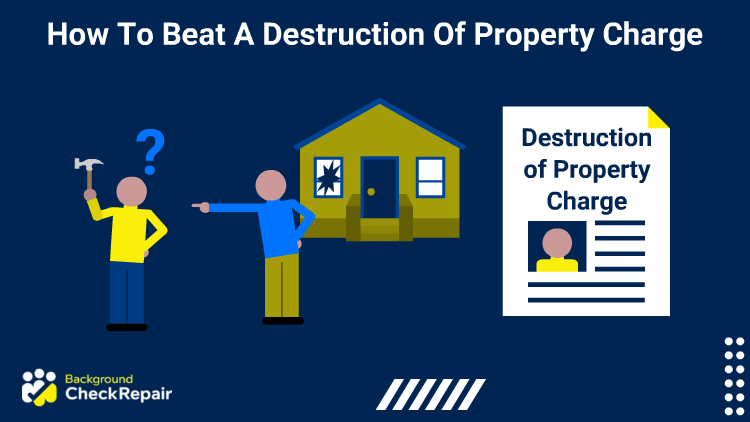
Table of Contents
Many individuals may find themselves potentially facing charges for criminal mischief and will want to know how to beat a destruction of property charge and save their record.
The first thing to do is conduct a free one-time-only background check on yourself. This will show whether or not the destruction of property shows up on your record.
If it does, this guide can help you reduce the impact a destruction of property charge will have on your record.
However, if you’re facing a destruction of property charge, there are some thing you can do to beat the RAP. This guide offers practical options for how to beat a destruction of property charge.
Although any kind of criminal record is something all individuals should avoid, from an employment standpoint, having a destruction of property charge on your record is not the worst thing in the world. Still, avoiding the charge altogether is always going to be the best course of action.
Keep in mind that in many cases, avoiding charges entirely will be difficult and will rely on factors outside the control of the individual.
Many individuals may not be entirely sure if there even was a destruction of property charge filed against them. In this case, individuals should use the search bar at the top of this page to perform a background check on themselves. This will show the individual’s entire criminal history record in just a few minutes.
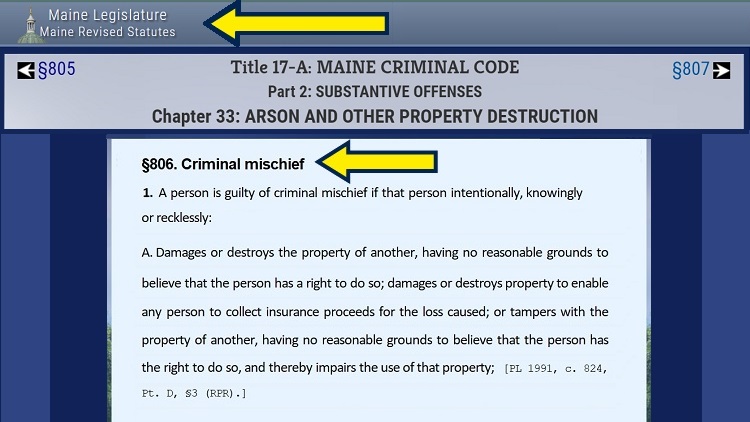
The criminal code in Maine outlines what defines criminal mischief, which is destruction of property conducted willfully.
As with any legal issue, individuals should consult with an attorney as soon as possible. This will not only give individuals a better idea of what options are available but the attorney may be able to ensure that charges are not brought in the first place, which would ensure the individual criminal record remains clean.
When it comes to a destruction of property charge, the exact charge will depend on a few different factors. Most notably, the cost of the damage to the property and who the property belonged to. Generally, if an individual commits property damage against the property of an individual, such as their car or home, the charge will fall under destruction of property or criminal mischief in most states.
However, if an individual commits property damage against government property, they can be charged with destruction of government property1 which is often more serious.
In both cases, the severity of the charge will depend on the extent of the damage to the property. In most cases the damage caused will be given a dollar amount and the level of charge will be determined based on this number. In most states there is a $1,000 cutoff that is sometimes referred to as the $1,000 rule.
In these states if the total cost of the damage is valued at $1,000 or higher, then the charge will be raised to a felony. If the damage totals less than $1,000 the crime will usually be charged as a misdemeanor.
All of this depends on a number of factors like the state, how the property was damaged and the value of the property. In many cases it can be possible to dispute the value of the damage, which is why having an attorney is so important early on in the process.
Many of the people ask questions like “if someone damages your property is it criminal damage?” Will likely have an incident in mind and will be wondering what their legal options are.
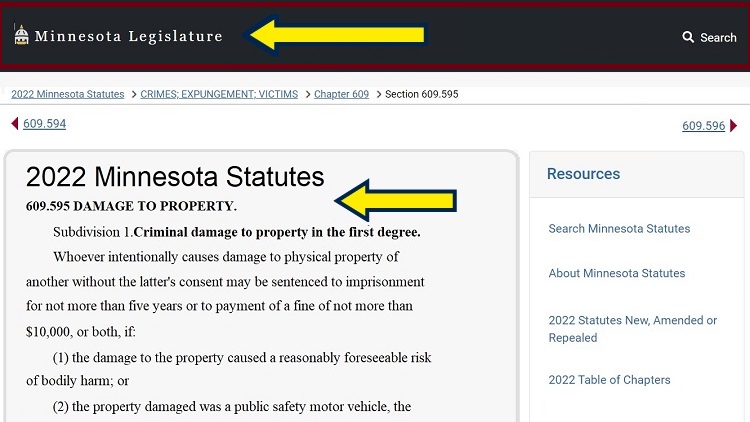
The Minnesota legislature defines damage to property penalties, which were recently updated.
In most states, destruction of property occurs when an individual knowingly damages someone else’s property. Although there are laws regarding damage due to negligence, for the most part, accidents that result in the destruction of property will not be considered criminal damage.
Many of those wondering how to beat a destruction of property charge will be wondering how to prove destruction of property. In most cases, proving destruction of property can be somewhat difficult, when it comes to getting criminal charges filed. Generally, the evidence surrounding the destruction of property will be circumstantial and difficult to prove that it was committed by any one individual.
This makes it unlikely that criminal charges will be filed unless there is concrete evidence such as photo, video or even eye-witness accounts in certain situations.
Destruction of property is a fairly common crime unfortunately and there are tons of examples that many individuals will already be familiar with. One of the most notable forms of destruction of property is when an individual slashes another individual’s tires. Since this results in notable financial damage, and since the individual that slashed the tires did so knowingly, this would constitute destruction of property.
Individuals do not normally have the power to press charges, as this is the duty of the prosecutor. If an individual was a victim of vandalism, the best thing to do is to document as much information as possible and report the incident to the police. The more evidence that law enforcement is supplied with, the more likely it is that the prosecutor will file charges against the individual who committed the vandalism.
Vandalism is rarely considered a serious crime, especially for a minor. When it comes to what are the charges for vandalism for a minor? State law will determine the penalty, which is often lighter than it would be for an adult offender. In most cases, the individual will be put on probation.
Many of those asking how to beat a destruction of property charge will also be wondering, can vandalism charges be dropped or are charges dismissible following indictment?
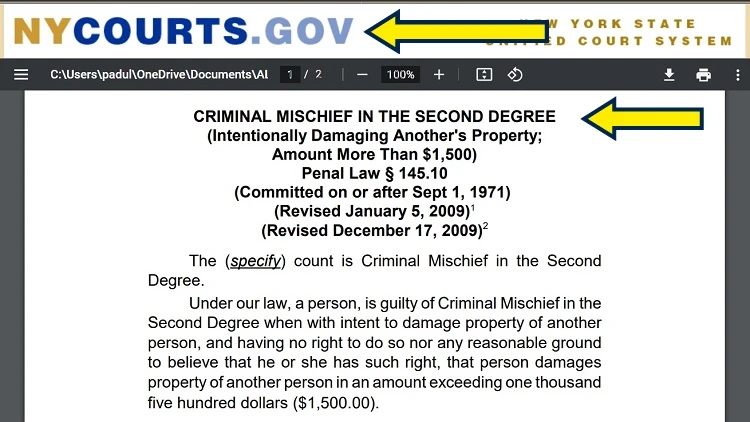
Criminal mischief in the second degree in New York occurs when the damage exceeds $1500.
Any and all criminal charges can be dropped at any point in the criminal proceedings. This can occur if there was a procedural issue with the case, if there is not enough evidence to convict the individual, or if new evidence exonerates the individual later on in the case.
The same is true for the question, can arraignment lead to charge dismissal?
The exact felony vandalism penalty will vary from state to state, however in most states a felony conviction for vandalism will have a maximum penalty of 1-2 years in prison and fines of around $100,000.
However, there are plenty of other factors that lead to the sentencing being worsened, especially if additional charges are added due to the circumstances of the crime.
Misdemeanor vandalism is usually charged when an individual vandalizes someone’s property and the cost of the damage totals less than $1,000. The maximum penalty for this crime is usually 1.5 years in jail and fines around $5,000. However, this will depend heavily on state law and if the individual is a first time or repeat offender.
Use the table below to learn more about property damage penalties in each state.
Individuals facing a first-time offense criminal damage will have slightly more options than most individuals do. Generally, sentencing is significantly reduced for first time offenders of low-level crimes. In many states, charges may be dropped entirely for some form of community service, in order to keep the conviction off the individual’s criminal record.
Many individuals will want to know how to beat a destruction of property charge and how to have charges dismissed pre-trial. Unfortunately, this is usually not a simple matter.
Since it can be extremely difficult to prove that an individual damaged someone’s property, charges are only brought if there is significant evidence against the individual. If this is the case, beating the charges can be extremely difficult.
The best thing to do is to hire an attorney as soon as possible. At best an attorney will be able to get the charges dropped entirely. If not, an attorney will likely be necessary to work out a plea deal in exchange for a reduced sentence.
Use the table below to learn more about the legal proceedings in each state to better understand what options are available when facing a destruction of property charge.
| How To Beat a Destruction of Property Charge | State Criminal Procedures |
| How To Beat a Destruction of Property Charge Alabama (AL) | Alabama (AL) Rules of Criminal Procedure |
| How To Beat a Destruction of Property Charge Alaska (AK) | Alaska (AK) Rules of Criminal Procedure |
| How To Beat a Destruction of Property Charge Arizona (AZ) | Arizona (AZ) Rules of Criminal Procedure |
| How To Beat a Destruction of Property Charge Arkansas (AR) | Arkansas (AR) Rules of Criminal Procedure |
| How To Beat a Destruction of Property Charge California (CA) | California (CA) Rules of Criminal Procedure |
| How To Beat a Destruction of Property Charge Colorado (CO) | Colorado (CO) Rules of Criminal Procedure |
| How To Beat a Destruction of Property Charge Connecticut (CT) | Connecticut (CT) Rules of Criminal Procedure |
| How To Beat a Destruction of Property Charge Delaware (DE) | Delaware (DE) Rules of Criminal Procedure |
| How To Beat a Destruction of Property Charge Florida (FL) | Florida (FL) Rules of Criminal Procedure |
| How To Beat a Destruction of Property Charge Georgia (GA) | Georgia (GA)Rules of Criminal Procedure |
| How To Beat a Destruction of Property Charge Hawaii (HI) | Hawaii (HI) Rules of Criminal Procedure |
| How To Beat a Destruction of Property Charge Idaho (ID) | Idaho (ID) Rules of Criminal Procedure |
| How To Beat a Destruction of Property Charge Illinois (IL) | Illinois (IL) Rules of Criminal Procedure |
| How To Beat a Destruction of Property Charge Indiana (IN) | Indiana (IN) Rules of Criminal Procedure |
| How To Beat a Destruction of Property Charge Iowa (IA) | Iowa (IA) Rules of Criminal Procedure |
| How To Beat a Destruction of Property Charge Kansas (KS) | Kansas (KS) Rules of Criminal Procedure |
| How To Beat a Destruction of Property Charge Kentucky (KY) | Kentucky (KY) Rules of Criminal Procedure |
| How To Beat a Destruction of Property Charge Louisiana (LA) | Louisiana (LA) Rules of Criminal Procedure |
| How To Beat a Destruction of Property Charge Maine (ME) | Maine (ME) Rules of Criminal Procedure |
| How To Beat a Destruction of Property Charge Maryland (MD) | Maryland (MD) Rules of Criminal Procedure |
| How To Beat a Destruction of Property Charge Massachusetts (MA) | Massachusetts (MA) Rules of Criminal Procedure |
| How To Beat a Destruction of Property Charge Michigan (MI) | Michigan (MI)Rules of Criminal Procedure |
| How To Beat a Destruction of Property Charge Minnesota (MN) | Minnesota (MN)Rules of Criminal Procedure |
| How To Beat a Destruction of Property Charge Mississippi (MS) | Mississippi (MS) Rules of Criminal Procedure |
| How To Beat a Destruction of Property Charge Missouri (MO) | Missouri (MO) Rules of Criminal Procedure |
| How To Beat a Destruction of Property Charge Montana (MT) | Montana (MT) Rules of Criminal Procedure |
| How To Beat a Destruction of Property Charge Nebraska (NE) | Nebraska (NE) Rules of Criminal Procedure |
| How To Beat a Destruction of Property Charge Nevada (NV) | Nevada (NV) Rules of Criminal Procedure |
| How To Beat a Destruction of Property Charge New Hampshire (NH) | New Hampshire (NH) Rules of Criminal Procedure |
| How To Beat a Destruction of Property Charge New Jersey (NJ) | New Jersey (NJ) Rules of Criminal Procedure |
| How To Beat a Destruction of Property Charge New Mexico (NM) | New Mexico (NM) Rules of Criminal Procedure |
| How To Beat a Destruction of Property Charge New York (NY) | New York (NY)Rules of Criminal Procedure |
| How To Beat a Destruction of Property Charge North Carolina (NC) | North Carolina (NC) Rules of Criminal Procedure |
| How To Beat a Destruction of Property Charge North Dakota (ND) | North Dakota (ND) Rules of Criminal Procedure |
| How To Beat a Destruction of Property Charge Ohio (OH) | Ohio (OH) Rules of Criminal Procedure |
| How To Beat a Destruction of Property Charge Oklahoma (OK) | Oklahoma (OK) Rules of Criminal Procedure |
| How To Beat a Destruction of Property Charge Oregon (OR) | Oregon (OR) Rules of Criminal Procedure |
| How To Beat a Destruction of Property Charge Pennsylvania (PA) | Pennsylvania (PA) Rules of Criminal Procedure |
| How To Beat a Destruction of Property Charge Rhode Island (RI) | Rhode Island (RI) Rules of Criminal Procedure |
| How To Beat a Destruction of Property Charge South Carolina (SC) | South Carolina (SC) Rules of Criminal Procedure |
| How To Beat a Destruction of Property Charge South Dakota (SD) | South Dakota (SD)Rules of Criminal Procedure |
| How To Beat a Destruction of Property Charge Tennessee (TN) | Tennessee (TN) Rules of Criminal Procedure |
| How To Beat a Destruction of Property Charge Texas (TX) | Texas (TX)Rules of Criminal Procedure |
| How To Beat a Destruction of Property Charge Utah (UT) | Utah (UT)Rules of Criminal Procedure |
| How To Beat a Destruction of Property Charge Vermont (VT) | Vermont (VT) Rules of Criminal Procedure |
| How To Beat a Destruction of Property Charge Virginia (VA) | Virginia (VA) Rules of Criminal Procedure |
| How To Beat a Destruction of Property Charge Washington (WA) | Washington (WA) Rules of Criminal Procedure |
| How To Beat a Destruction of Property Charge West Virginia (WV) | West Virginia (WV) Rules of Criminal Procedure |
| How To Beat a Destruction of Property Charge Wisconsin (WI) | Wisconsin (WI) Rules of Criminal Procedure |
| How To Beat a Destruction of Property Charge Wyoming (WY) | Wyoming (WY) Rules of Criminal Procedure |
The question of what happens when you file a police report for vandalism is extremely common. Although filing a police report can seem intimidating, the process is fairly simple. Individuals who are a victim of vandalism will simply need to contact law enforcement with the situation. When this happens a law enforcement officer may come to view the damage if it is serious enough, otherwise the victim may be asked to come to the law enforcement office to fill out the report there.
Many people will be wondering how to prove vandalism in court, especially if they have a suspicion of who committed an act of vandalism against them. Unfortunately, proving vandalism is extremely difficult without concrete evidence such as photos or video of the incident taking place.
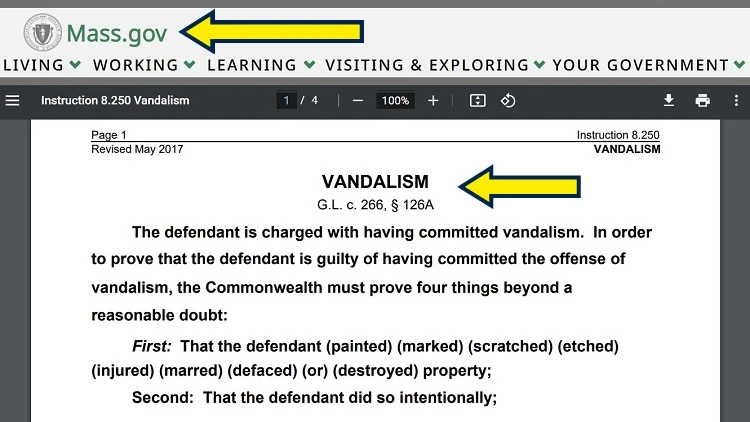
Charges of vandalism usually require proof to proceed, and the burden of proof is on the state.
Facing criminal charges can be a stressful time, especially when individuals start to consider the long-term effects this will have on their background check. However, knowing how to beat a destruction of property charge is actually fairly simple and should help individuals better understand the legal process.
Yes, individuals who intentionally damage another individual’s property can go to jail if they are convicted of destruction of property.
Individuals do not normally have the power to press charges. However, individuals can present law enforcement with all the information they have. If the prosecutor thinks there is enough evidence to convict, they will likely press charges.
The Punishment for vandalism in school varies from state to state. Check with local law enforcement for specific times.
Do background screenings show pending charges? Yes, pending charges show up on background checks.
Does a dismissal affect your criminal record? It depends on the state where the charges were filed.
People asking, how do I know if I’ve been implicated in a crime can run a criminal background check on themselves to see what crimes show up.
Is there a way to learn how to look up legal charges on a person? Yes. When searching for ways to look up charges on someone, you may search state-level and county-level court records.
When wondering about what happens when someone makes formal allegations against you, you can conduct a criminal history search on yourself.
It can be stressful to get involved in crimes. You can get ready by learning “how to determine if charges have been filed?”. To find out if criminal charges are filed, you need to know your rights and the difference between police investigation and criminal charges.
Yes, you can be charged with a crime without knowing.
Yes, charges can be dropped at an arraignment hearing.
To know the time limit for police to bring charges against you, you can search for statutes of limitations of your state and conduct a background check on yourself.
1U.S. Department of Justice. (2020, January 17). Criminal Resource Manual 1601-1699. The United States Department of Justice Archives. Retrieved October 5, 2020, from <https://www.justice.gov/archives/jm/criminal-resource-manual-1666-destruction-government-property-18-usc-1361>
We use cookies to ensure that we give you the best experience on our website. If you continue to use this site we will assume that you are happy with it